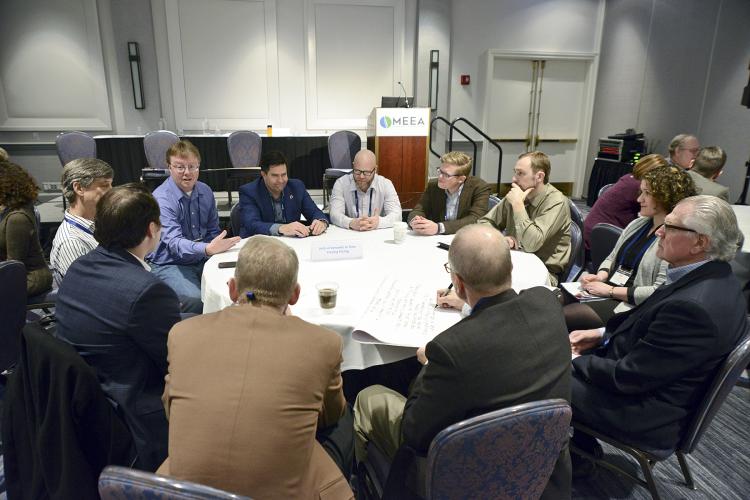
This year's Midwest Energy Solutions Conference (MES) incorporated interactive workshops into its agenda for the first time ever, and one of the three workshops focused on Net Zero Energy (NZE) in the Midwest. MEEA staff wanted attendees to consider what Net Zero Energy means for energy efficiency (EE) in the Midwest specifically. (For the purposes of the workshop, “NZE” was referring to any building, development or community that does not use more energy than it produces. See DOE’s NZE definitions).
To kick things off, MEEA’s Building Policy Manager Alison Lindburg highlighted several commercial NZE projects, such as Richardsville Elementary School in Bowling Green, Kentucky, which is the nation’s first Net Zero school, and the new NZE police station in Cincinnati, Ohio. She also touched on some progressive community efforts and goals. Bloomfield, Iowa, for example, has committed to be an NZE-electric community by 2030, and in Charles City, Iowa you can find an NZE development. Alison discussed the new Destination Mayo Clinic in Rochester, Minnesota and the former Ford automobile site in St. Paul, Minnesota, which have both set NZE goals. St. Louis, Missouri has also set a target to be 100% clean energy by 2035, and this includes energy efficiency measures. Alison concluded by highlighting that in Indiana (and soon Missouri), some modular home builders are constructing to the very energy-efficient Passive House US standard.
NZE Leaders Across the Nation
In order to facilitate the conversation, MEEA invited three subject matter experts to share their own perspectives on Net Zero Energy. Larry Brand, the President of Frontier Energy Inc., spoke about some national best practices and policies he is seeing, which include California’s Residential and Commercial New Construction Energy Action Plans, which aspire to have all new construction be NZE by 2020 and 2030, respectively. The commercial plan also aims to have 50% of existing commercial buildings retrofitted to become NZE by 2030. These plans are supported by the California Public Utilities Commission. California has several policies in place to help drive these ambitious goals, such as Senate Bill 350, Assembly Bill 32 and Assembly Bill 802. Larry also mentioned the role the Department of Energy plays in driving Net Zero Energy, highlighting DOE’s Zero Energy Ready Home program, their Building Technologies Office and the Climate Action Plan, to name a few.
Natural Gas and NZE
Erica Larson, a Regulatory Analyst at CenterPoint Energy, spoke about CenterPoint Energy’s new Passive House program, which covers the application fees for new buildings that achieve Passive House certification. Coming from a gas utility, Erica shared some of those specific challenges – for one, there is no NZE certification that includes gas. Additionally, when a home is built or retrofitted to be extremely tight, the natural gas furnace options properly sized for the smaller heating load often become expensive, deterring homeowners from installing them at all.
A Builder's Perspective
The final speaker was Lindsey Elton, owner of Eco Achievers, a business that provides testing and green building certification services for programs that include Passive House and DOE’s Zero Energy Ready Home. Lindsey touched on some of the challenges that are specific to builders and contractors in this space, like lack of utility incentive programs, low awareness of NZE benefits, and an initial lack of incorporating NZE into the design phase and implement during construction.
Group Discussions
What are the challenges for NZE in the Midwest?
After the subject matter experts shared their unique and diverse perspectives, the small groups got to work. We asked attendees to brainstorm the challenges associated with Net Zero Energy. Some challenges were specific to utility companies, like fuel switching concerns, the cost-effectiveness of NZE programs and the impact NZE could have on overall utility revenue.
Others expressed concerns surrounding energy codes—that code requirements for new construction are not stringent enough to get to this point, baseline energy codes have inconsistent compliance, and that overall energy code enforcement is unclear. One group expressed the need for more inspectors with more time and for incentives given to code officials who enforce the full energy code, not just parts of the energy code.
Other challenges were specific to consumers, such as the upfront costs associated with NZE, apprehensiveness to try new things and solar’s popularity over energy efficiency measures. Small groups also expressed the need for training and educating contractors and real estate institutions surrounding NZE. Attendees also noted that our region has an old housing stock and the challenges associated with retrofits.
What policies, incentives or programs can drive NZE forward?
To overcome these challenges, many tables suggested incentives like new construction rebates that are higher for NZE projects and offering higher rebates for larger, more expensive projects. Some tables focused on contractor needs, such as better coordination between subcontractors, certifications and/or endorsements for qualified contractors and the need for a robust contractor network to drive down costs for customers. One group pointed out that as the workforce gets older, the opportunity to influence the perspective of the new generation is growing. The consumer was also a primary focus during this discussion, with groups emphasizing education and outreach, so homeowners to will better understand NZE home-building and -buying.
Detailed responses from each group for both brainstorming questions can be found here.
What’s Next?
For the final part of the workshop, attendees envisioned a path forward for NZE in the region. While several hurdles were reiterated, responses were overall favorable to expanding NZE. Attendees were also asked to share what MEEA could do in this space and what sorts of tools are needed. Attendees suggested:
- Developing education materials
- Conducting research and case studies
- Designing guidelines
- Convening stakeholders
- Facilitating information-sharing
- General advocacy
Get involved!
MEEA is gauging interest in a Net Zero Energy collaborative. Are you interested in participating? Do you have other thoughts surrounding NZE and what MEEA can do in this space? Send us an email and let’s connect.